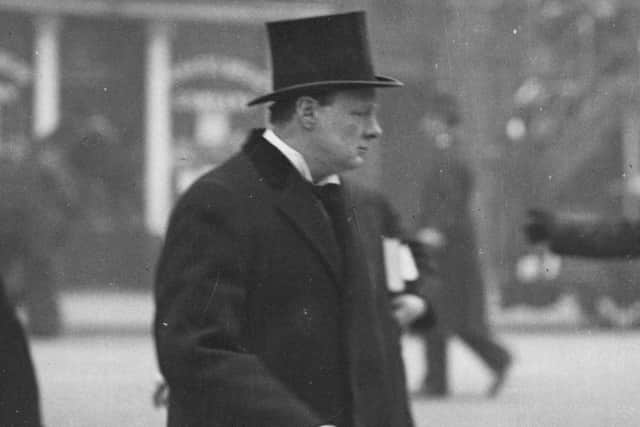Henry McLeish: Federalism can stop Scottish independence


The idea of a Federal Union has been around for a long time. Speaking in a House of Commons debate on the 9 April 1889, Mr Hunter, the Honourable member for Aberdeen North said: “I have come to the conclusion that the Federal form of Union is the one which gives the greatest hopes of obtaining the objects of representative institutions in the future … look forward to the day when England herself shall be merged in a higher unity, and when, although we may not live to see it, there will be established that which would be the greatest blessing to the world – namely, the United States of Europe. That is the direction of our ideas and aspirations.”
A quarter of a century later, in a speech to his Dundee constituency on 9 October 1913, Winston Churchill spoke of the, “establishment of a Federal System in the UK, in which Scotland, Ireland and Wales, and, if necessary, parts of England could have separate legislative and parliamentary institutions”.


Advertisement
Hide AdAdvertisement
Hide AdThese were remarkably inspiring and prescient speeches. The wisdom of the past is needed now, to reignite a constitutional debate that has lost impetus. New thinking, ideas, and action, which will ultimately offer a new alternative and vision to the Scottish people, are urgently needed. The debate must move on from the narrow terms of the SNP, independence, and old devo-unionism.
Setting aside the recklessness and chaos of Brexit, there are wider and more important lessons to be drawn for our weak democracy and broken politics, and indeed for the way we are governed.


The EU referendum, an avoidable disaster, was the worst method available to settle big issues. Brexit, the product of cult politics and ineffective government, has laid bare the chronic deficiencies of our politics and democracy and has created the idea of binary mindsets. Everything is viewed in black and white; the winner takes all and there is never scope for compromise. There are no coalitions of interest, no regard for consensus, where one vote is a majority and that’s enough to settle huge issues of national and international importance. Referenda have now been cast into the spotlight as weapons of mass division.
We are locked into the politics of extremes. This is the logical outcome of our two- party system, tribalism to the point of legislative irrelevance, an archaic first past the post system of voting and binary thinking: and the public being taken for fools, with much of the press acting as cheer leaders for this insane form of political decision making. Scottish politics must learn lessons from the tragedy of Brexit.
The “settled will” of the Scottish people doesn’t exist. Scotland is divided on the issue of independence. Surely our democracy and our politics must evolve to the point where we don’t see each issue through the prism of conflict and where one-size answers fit every conceivable question. There are few absolutes in politics. We need to accept this and move on from our insular and partisan approach.
Federalism could start to address these political and philosophical questions and help create a deeper and smarter debate. Brexit has shown that slim majorities can undermine national solidarity, cohesion, and stability and create powerful divisions, which will not go away. The bitter legacy that befalls the defeated and the discontented can be enduringly destructive. Scotland’s challenge is to avoid us.


Resolving the constitutional question is about building as much consensus as possible. In Scotland today, there is none. Federalism is the way to achieve this. Federalism may also help an England that has lost its way, is steeped in sentiment, was largely responsible for Brexit and now nurtures right wing conservatism, populism and a growing sense of isolationism and economic nationalism. England and Westminster remain the biggest threats to the Union. They must be part of the solution.
Federalism is complex, has many forms, requires leadership and vision and is a tough constitutional alternative to independence. But it is about building consensus, coalitions and compromise and embracing the notion that we needn’t fight to the death on issues that are divisive.
Advertisement
Hide AdAdvertisement
Hide AdThe constitutional debate is about power: power that Westminster will not share. Power devolved is not power shared. The devolution of “more powers to Scotland” is not a solution when real, “political power” is not on offer. Article 50 brutally exposed the weakness of the Holyrood settlement: the result of a Westminster mind set shaped by centuries of history.
There is no fixed model of federalism, but it is not Home Rule, Devo-Unionism, or Independence. It is best defined as two levels of government, each of which has independent powers and neither has supreme authority over the other: this is the crucial distinction between federalism and devolution or home rule. We must be very careful about selling devo plus or devo unionism as federalism.


What would be the main distinguishing characteristics of federalism? First, it requires a written constitution. In the case of a federation, the national constitution distributes the constitutional powers of government between the two levels. They do not receive their respective powers from legislation enacted by the national(Westminster) legislature. They come from a common source, a national written constitution.
Second, absolute sovereignty of Westminster – a doubtful reality anyway – would end. Under federalism the separation of powers is permanent and enshrined in a separate constitution. For the first time, power would be taken from Westminster and given to people and nations.
Third, England would require a constitutional status, in line with the other nations of the UK. This is vital as the voice of England at Westminster continues to drown out the other nations.
Federalism deserves a serious airing. Scotland needs a consensus on a way forward. A new approach to the Scotland question must overcome the pitfalls, poison and deeper political questions posed by Brexit. Federalism is all about “effective”, power. Rejection by Unionists will inevitably lead to an independent Scotland, time line unknown. For Nationalists hostility to federalism may mean decades of political dispute, division and “neverendum” politics. Scotland deserves a choice that is currently denied.
Consensus, coalition, collaboration, and compromise are not weak or difficult concepts, but the hallmark of a more mature and solution seeking politics.
Using insights from Churchill’s Dundee speech, questions remain. Is federalism now inside “the sphere of practical politics” or is it just about “reflection and discussion rather than prompting action”. Or are we speaking “of the immediate future”, or just dreaming of a new political order that can never be?